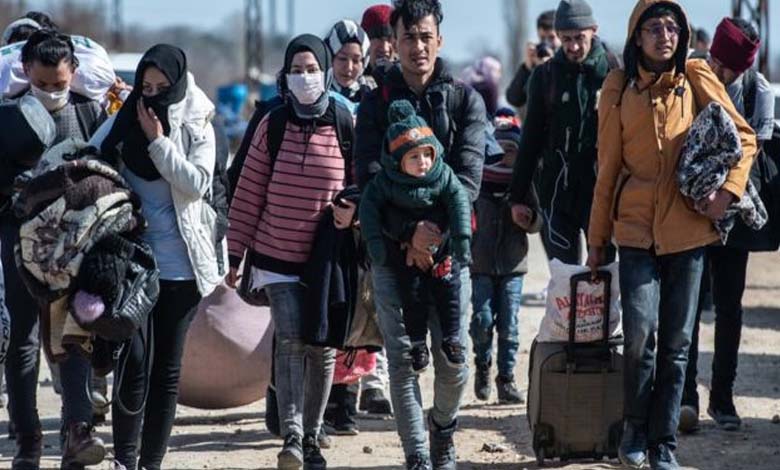Restrictions on Syrian refugees for deportation from Turkey

Turkey is witnessing a security campaign targeting what the authorities call “Syrian refugees ,” with the arrest of violators becoming an almost daily occurrence. However, many of those affected by the campaign, especially Syrians, claim to have residence permits, yet they are pressured to sign voluntary return papers.
Turkish authorities detained 17 “illegal” Syrian refugees on Saturday in the city of Bursa, following the arrest of 72 refugees in the Kahramanmaraş province, with some being deported.
Turkish media reported the arrest of Syrian refugees, stating that the police received information about young people in an apartment in one of the neighborhoods of Bursa. According to reports, the Syrian youth were inside the house, but upon receiving the report, the police quickly moved to arrest them, taking them to the Turkish Directorate of Migration in the region. The official procedures for their deportation beyond the borders have begun.
Turkey plans to expedite the deportation procedures of Syrian refugees and aims to send back 200,000 Syrian refugees to their homeland by 2024 as part of its comprehensive strategy for managing migration and border security. The Turkish Ministry of Interior is working with other ministries to achieve this goal, focusing on effective deportation and establishing a suitable visa and residence permit system.
Turkey currently hosts around 4.9 million foreigners, including 3.27 million Syrians under the “temporary protection” status, according to the latest statistics from the Turkish Presidency of Migration. The Ministry of Interior aims to enhance collaboration between agencies to assess visa applications more efficiently and establish new regulations to strengthen the visa system. Turkey will also work to improve cooperation with other countries to prevent the entry of foreigners who do not meet Turkey’s entry conditions, continuing to install physical security systems, surveillance systems, and technological detection systems to increase border security.
Since 2016, Syrians in Turkey have been prohibited from leaving the registered provinces without a “travel permit” issued by the Turkish Directorate of Migration. Those without a “travel permit” risk detention by Turkish authorities on the grounds that they possess a temporary protection card (kimlik) issued by a different province than their place of residence. They may face several days of detention and deportation to a matching province or a different province with a financial penalty.
Authorities may deport refugees violating this system to northern Syria, which Ankara considers a “safe zone.” Turkish Minister of Interior Ali Yerlikaya announced on December 5 the arrest of 173,550 “illegal” migrants without specifying their nationalities in the last six months.
These statements came during a meeting with Turkish media representatives at the Coordination Center for Security and Emergency Situations, affiliated with the Ministry of Interior, to discuss actions taken to combat illegal migration. On October 12 last year, the minister announced the deportation of around 49,000 “illegal” migrants to their countries without specifying their nationalities in the last four months.
According to a press release from the Center for Refugee Rights (Migration and Asylum Center) in the Turkish Bar Association, which addressed the situation of Syrian refugees in the Migration Directorate and deportation center in the province, Syrian refugees face numerous violations in a systematic policy of forced repatriation imposed on them by the Presidency of Migration.
Activist Taha Al-Ghazy said, “In the deportation center, the rights of Syrian refugees are violated in terms of meeting with their lawyers or relatives, as legal teams are prevented from meeting their clients on various pretexts, such as the absence of the Syrian refugee in the deportation center or the failure to provide any data related to the file of the detained refugee. The delay in the meeting for several days between legal teams and their clients often leads to the transfer of the Syrian refugee to another deportation center in another province.”
Several Syrian refugees have been documented facing numerous violations, such as psychological and physical violence by deportation center employees, aiming to force them to sign voluntary return documents.
Activists argue that this suffering continues in the almost complete absence of positions from Syrian opposition institutions, organizations, committees, and affiliated bodies regarding the Turkish government’s policy of imposing “forced repatriation” or the violations faced by Syrian refugees in deportation centers.
The positions of most of these institutions, organizations, committees, and their functional roles have been limited to emphasizing compliance with the decisions of the Presidency of Migration. There are no safe areas in Syria, as confirmed by the Independent International Commission of Inquiry in its latest report, stating that this situation extends across the entire Syrian geography. Therefore, deportation poses a danger to the lives of those deported, and those who refuse to sign voluntary return papers find themselves in deportation centers or prisons, which is not better than that.












